The Großdeutsche Lösung: The Austrian variation
- Thread starter Kurt_Steiner
- Start date
-
We have updated our Community Code of Conduct. Please read through the new rules for the forum that are an integral part of Paradox Interactive’s User Agreement.
You are using an out of date browser. It may not display this or other websites correctly.
You should upgrade or use an alternative browser.
You should upgrade or use an alternative browser.
Yes minister references, priceless"in due time... in the fullness of time... when the moment is ripe..."
Well good update about your Imperial expansion(and what sisy so special, she is loved in hungary for being so pro-magyar and was considered one of the reason of which the ausgleich was adopted) in Africa and the Russia Humillation(losing the Baltic in the french was the hillarous, the objective should be backward. Poland for france and the Baltic to prussia), and that will be that you can win a excellent ally in the future?
Well, waiting when the Kampf begin
Att
Nivek von Beldo
Well, waiting when the Kampf begin
Att
Nivek von Beldo
The Großdeutsche Lösung: The Austrian variation
4. Prussia delenda est.
The short war for Cracow was over by early April, 1862. and Europe was puzzled because no one understood why Vienna has taken such an step against the tiny state. But if the foreign powers were upset by that step, Vienna kept on buidling its colonial empire: Uganda became an Austrian colony in late July.

Meanwhile, México had been defeated by the British, who obtained territorial compensations hin the area. Such was the decay of Mexico that Spain and France send their armies there to defend their investments in the country. Meanwhile, the Confederate States were still resisting the Federal onslaught, but they began to show signs of exhaustion. Austria, on its part, was not interested in the Amrican continent, not even if an Habsburg was in troubles in Mexico. Austria was busy.

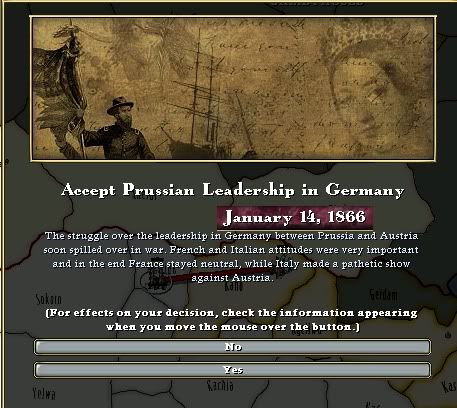
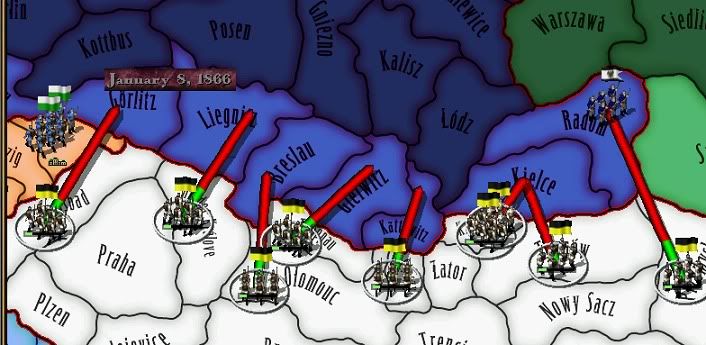
Then, the Austrian High command made a mistake. The 5th Corps was ordered to storm Berlin, hoping to put a fast end to the war. Encircled, with its lines of communication cut, the 40,000 strong force was surrounded in the environs of Berlin and decimated. This, however, did not stop the Austrian onslaught. The orders were to race to the Baltic Sea.
That movement allowed to encircle a small Prussian force and to return the shame of having an army encircled and destroyed.
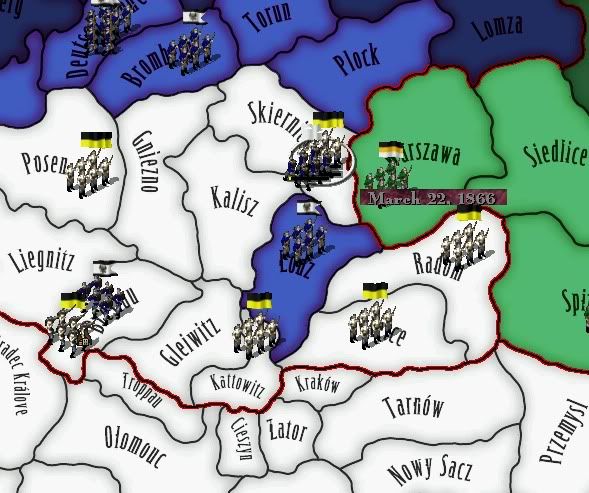
The advance to the Baltic shores led to the great battle of Bromberg, which broke the back of the Prussian army of the North and allowed the Austria cavalry to move unmolested to Danzig.

By early June the battlefront had this aspect. The continuous advance led to the defeat of many small Prussians formations that, had they been combined in one single body, could have caused many troubles to the advancing Austrian army. By early September, Berlin was again bombed by the Austrian guns. And the USA and the CSA came to a gentleman's agreement. Both would return to their pre-war borders. The next war would settle the American question.
In early January 1867 Prussia send peace fealers, which only confirmed Austria's will to win the war, and were rejected. Vienna wanted the total submission of Prussia.
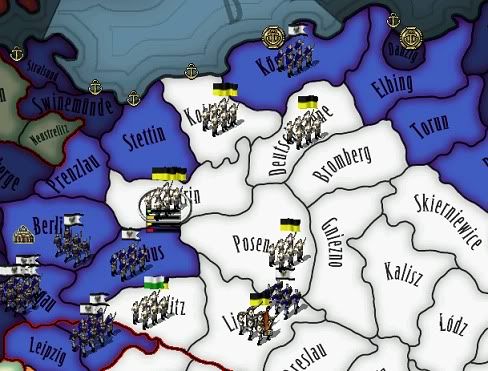
Austria still had to invade the Ruhr and to encircle Berlin to persuade Prussia that to surrender was the better of the possible deals with Vienna. Thus, fianlly, peace came on February 6th, 1867. It was time to prepare for a minor reorganization of the German states and, then... the Big Push.
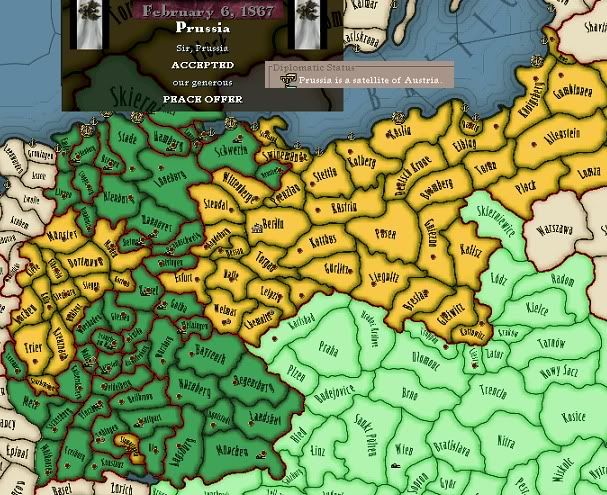
@Serek000: I needed for my future plans about Poland.
@Misconstruction: We shall see. About the fast colonization, I can only say that the vanilla surprised me in this game. I don't know if it was the quick grabbing of the rubber production areas or what, but money just flooded economy. The rest, it was just a question of buying what I needed to build the colonial settlements. And time.
@Enewald: In due time, I shall consider that option.
@FlorisDeVijfde: Appleby is priceless, I must admit.
@Nivek Beldo: I'll return the lost provinces to Russia -after giving a nice ransom to Prussia to win the Tsar's heart. Then, you shall see.
@Middelkerke: Oh no, I plan to have a nice Empire, but not too big.
Nice expansion to the north. You are well on your way denying Prussian ambitions in Germany and replacing them with your own.
It really does warm my heart to see the might Prussian military brought to its knees.
The Großdeutsche Lösung: The Austrian variation
5. The heir.
Prince Lichnowsky found a suitable replacement in a youngster that was arousing a bit of a upheaval in Vienna for his curious sense of humour. He was an Austrian-born, but, as his father was from Portugal, he did not "sound" (nor look) quite Germanic. His name was José Mário dos Santos Félix Mourinho. Just the name made him quite insuitable as a replacement. Worse still, he was a commoner. Von Lichnoswky, however, had learnt a few tricks during the conquest of Africa and the defeat of Prussia, and thus he managed soon to get rid of the troublesome aspects of the deal (i.e José's family -mother, father, three brothers, two sisters and a turtle-, to be precise, who died because of some poisoned food when José was away) and then began to work in the real question: the Germanization of Mourinho.
Poor José, orphan and alone in the world, managed to get adopted by a well-bred family of the Austrian nobility and soon appeared to the Viennesse high society as Joseph Felix von Mourrinen und Lichtenberg. He was a quite charming young -if you could forget his habits of calling himself "the Special One", of course.
However, Lichwnowsky had found a replacement and, while Lichnowsky brainwashed... erm..., instructed the young pupil the the arts of the good government, the prince, as said, was a bit busy, for the while being, trying to bribe Prussia.
King Wilhem was not in the best of terms with Austria since the defeat of 1866. The bargain that made him hugely rich in exchange of some Polish lands (1) had not softened the memories of being almost the ruler of Germany, and Lichnowsky, with the full agreement of the Kaiser Franz-Joseph, promised to the Prussian all the minor German states in exchange for his full support when the war with France came. It goes without saying that Prussia was more than happy to oblige, as beating France was some kind of hobby for them, but, with the yummy bait in front of his face, Wilhelm failed to see that receiving those lands from the Austria Emperor put him in a subservient situation.
Alàs...
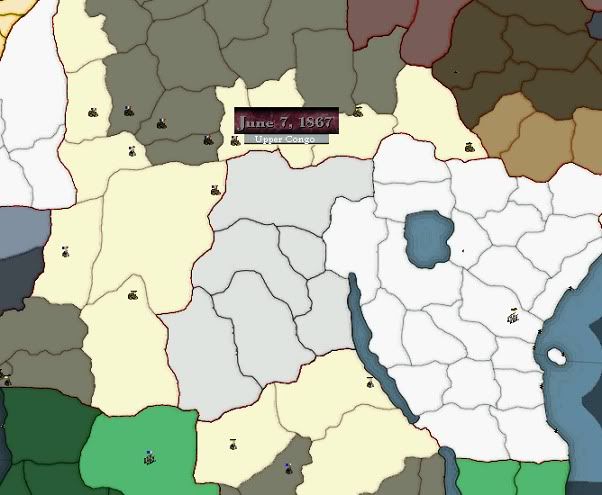
Meanwhile, the Upper Congo was proclaimed, officially, as an Austrian colony and the dream to rule Africa from East to West began to be closer to its fullfillment.
Then, a small provocation, a silly reply, you know, that kind of things that happen when telegrams are sent to settle territotrial demands ended with Hannover declaring war to Prussia, a few weeks before Austria's date for the planned conflict. Well, war, war never changes...
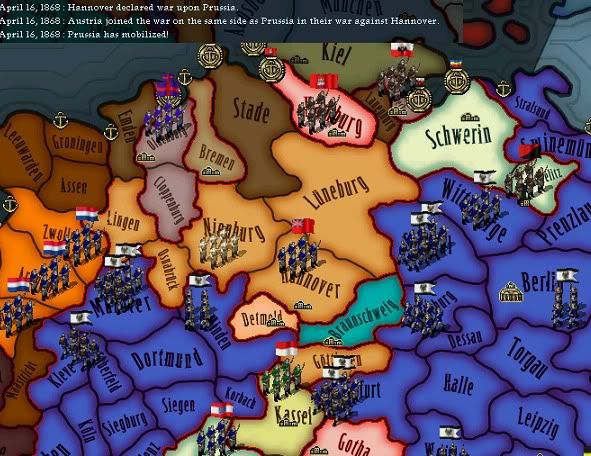
Prussia wasted no time and soon him armies were moving deep inside of Hannover and brushing aside any pathetic attempt to resist their onslaught. The war was nothing but some kind of military exercises with lively ordinance, one could say, and it worked to the perfect satisfaction of the Prussian king, who saw Hannover humbled and squashed in only four months.

Then, a month later, and by another sheer coincidence, another telegram transformed a petty nuisance between Mecklenburg and Austria, and war, again, ensued, with all the minor allies of Austria -but for the Southern Block- changing sides, to the delight of Prussia. This time the Austrian Army was placed to attack. In twelve days Braunschweig was defeated and annexed to Prussia (September 18, 1868).
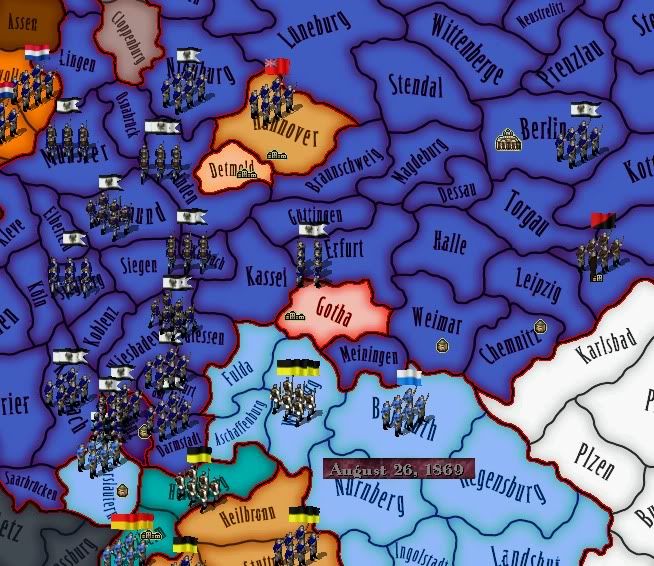
However, the submission of the central states was a more delicate affair that was not sorted out until late January, 1869. This mess allowed Austria to make a small present to Bavaria, in the shape of Fulda, which was annexed by the Southern ally of Viena. The Bavarian perfomance was so poor that it caused the following telegram:
"Zank you for nice war. STOP. Fery funny but a way too short. STOP Next war refrain from bringing the saussage-eaters wiz you. STOP
Bismarck".
With Holstein puppetized by Austria after the Kiel Treaty (November 5th, 1869), there was a sudden frenzy to finish the "North German" question. Thus, the northern half of Germany was "pacified" by the Prussian armies and the southern bit by the Austrian. Thus, by later March 1870, Prussia was finally at peace.
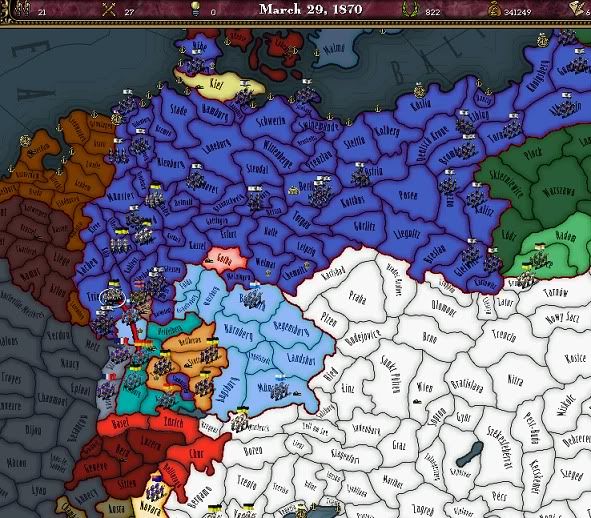
(1) I bought the lands that Prussia took from Russia during the Crimean War and returned them for a cheap price to the Tsar. It goes without saying that I lost a bit of money (money? who worries about that having Africa?!?!?!) in those deals, but now, as Forrest Gump would say, Russia is my most best friend.
@FlorisDeVijfde: Well, I hope that, once Germany is in, I can finish my African Empire...
@Serek000: I found myself being a in odd situation, I must confess...
@Middelkerke: All German lands are Germany but not all the Austrian Empire is German...
@Enewald: As usual. I'm distrusted by the Brits (as usual), ignored bt the Yanks, hated by the French
@Najs: Thank you!
Last edited:
Ok, the truth: I run out of ideas about finding a suitable replacement for Lichnowsky and, as it is usual in me, I've resorted to my wonderful sense of humor and one of my favourites "villaines" of all times. I doubted between Mou and Hans Gruber, from 'Die Hard' but in the end... well, my silly side won.
Last edited:
The Russkies will make useful friends.
Any plans for Switzerland? Strategically speaking it would be helpful for the eventual attack on Italy and maybe even France.
Any plans for Switzerland? Strategically speaking it would be helpful for the eventual attack on Italy and maybe even France.
You do realize that sooner or later, Poland will be an independent state simply by revolts by the Poles. Shouldn't you just support the Poles and their drive towards independence, or simply liberate them when you had the chance?
O
OneiricRose
Guest
Quite cool though I prefer to unify not using Prussia, using the latest VIP I won and united it through the South German Fed (Bavaria before) and then slowly absorbed my vassal state.
Interestingly I expanded exactly on the same african regions with my Austria, also I intervened in Crimea to prevent Prussian advance and in future wars gained Ukraine.
Then in my version of WWI I couldn't resist smashing Russia and annexed all Poland, Lithuania, Ukraine and Baltic States lmao.
On the Balkans I took Romania, Serbs, Bosnia, created Bulgaria and expanded a satellite Greece.
In Italy I kept North Italy and punished Sardinia-Piemont for backstabbing me with the french. (eventually annexed them) and reassembled Italy between North Italy(austrian rule), center with Tuscany, south with Two Sicilies.
France tried to annex Switzerland and I kicked their asses taking Alsace-Lorraine.
Finally to ultimately disappoint you since 1865 or so Socialist always won election with 80% of votes lol, and in one save of mine commies won election and turned the Austrian Empire into some Austrian Communist Union :wacko::rofl:
Interestingly I expanded exactly on the same african regions with my Austria, also I intervened in Crimea to prevent Prussian advance and in future wars gained Ukraine.
Then in my version of WWI I couldn't resist smashing Russia and annexed all Poland, Lithuania, Ukraine and Baltic States lmao.
On the Balkans I took Romania, Serbs, Bosnia, created Bulgaria and expanded a satellite Greece.
In Italy I kept North Italy and punished Sardinia-Piemont for backstabbing me with the french. (eventually annexed them) and reassembled Italy between North Italy(austrian rule), center with Tuscany, south with Two Sicilies.
France tried to annex Switzerland and I kicked their asses taking Alsace-Lorraine.
Finally to ultimately disappoint you since 1865 or so Socialist always won election with 80% of votes lol, and in one save of mine commies won election and turned the Austrian Empire into some Austrian Communist Union :wacko::rofl:
The Großdeutsche Lösung: The Austrian variation
6. The German Empire.
That Bismarck was able to create a war from the silly Spanish Question was quite remarkable, Lichnowsky thought. Without the Spanish offering the throne to the German prince Leopold of Hohenzollern-Sigmaringen, a Catholic as well as a distant cousin of King Wilhelm of Prussia, there would have been no war, of course. But France's pride and Bismarck's capacity to twist events into his favour proved to be the key factor.

On June 3, 1870, Europe saw another war. Lichnowsky had been eagerly waiting for it, but Prussia won the race. The first actions were undertook by the Austrian Forces already there, with an attack against the fortified areas of Mulhausen and Strassburg, that were only tinly garrisoned. Meanwhile, reinforcements from the rest of the Empire were sent to the front. Apparently, when Strassburg was taken by the Austrian army by early July, Lichnowsky was worried about the lack of reaction by the Prussian army -together with the passivity of the southern German Allies-, thus he decided to launch a probing attack against Metz.
Suddenly, Austria discovered why Prussia had remained so "iddle". Bismarck was trying to bring Russia into the war, and, on July 5th, the Tsar declared war against France. It was a "oh là là" situation, indeed.
The front remained calm in the West, until a sudden spark of activity took place in the East, as the Prussian and Russian armies attacked the areas held by France since the end of the Crimean War. No one in Paris had thought that the Russian Bear could be so resentful, it seemed.
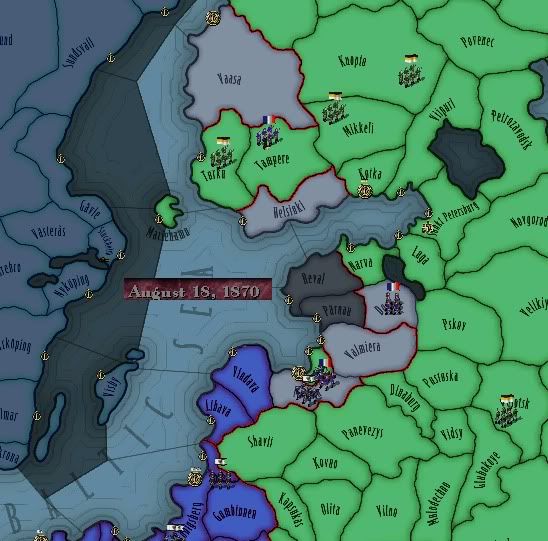
Apparently, the French politicians thought that Russia was quite busy trying to humble Korea. They were proved to be awfully wrong.
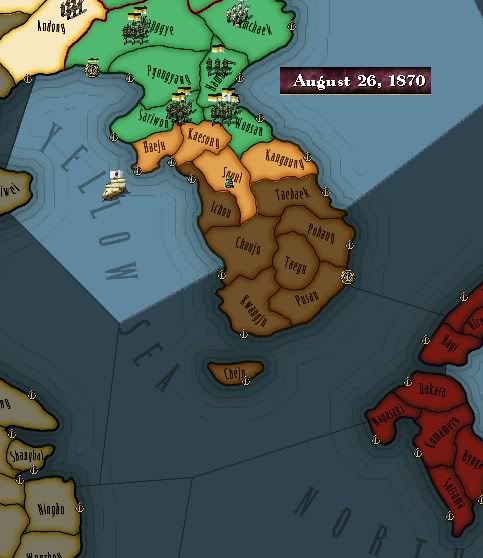
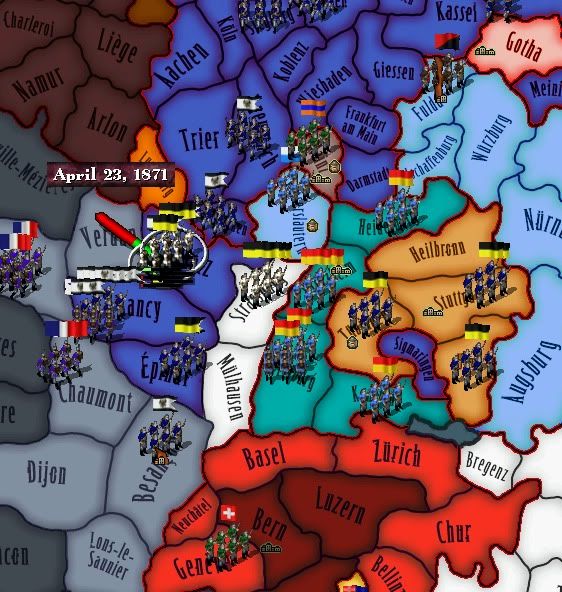
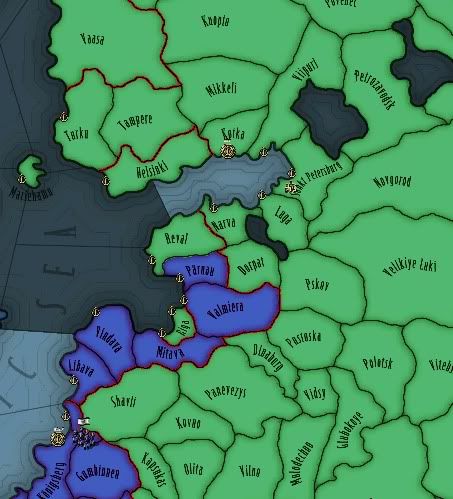
Meanwhile, Japan had joined the Korean side, but, apparently, Tokio was unable to resist the Russian onslaught.

When the Prussian and Austria forces reached the outskirts of Paris in October, the end of the war was only a matter of weeks, as the armies of the Kaiser, not waiting a single moment to rest, stormed the City of Lights at once. Finally, on November 29th, 1871, Paris was taken by the Combined Allies. It still took a few weeks to the French to see that they wre defeated. The French Second Empire was overthrown in a bloodless and successful coup d'état which was launched by General Trochu, Jules Favre, and Léon Gambetta at Paris on December 4th.

Finally, on December 12, 1871, France surrendered and the German Empire, with the Austrian Kaiser as its head, was born.
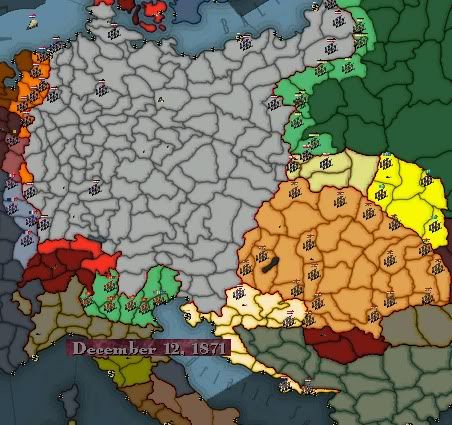
As Austria joined Germany and Franz-Joseph became the first Emperor of the unified German Empire, Hungary, Poland, Ukraine, Italy and Croatia became puppet states of Vienna, which was now the capital of the new Empire.
The former Austrian colonial Empire, now Germanized, stretched from East to West Africa: Nigeria, Cameroon, Equatorial Africa, Upper Congo, Uganda, Tanganyka, Swahili Coast, Kenya and Bahr el Ghazal (south Sudan).


@Serek000: Indeed. The Russians managed to wipe out some French divisions and to give a helpful hand with some technologic exchange -who would have guessed...-. About Switzerland... No, no plan about them. But now you mention it.
@Enewald: What does not make sense?
@hoi2geek: That was the plan all the way long
@TheConqueror: Interesting... you have given me some good ideas...
Last edited:
You must regain the Austrian Littoral from Croat occupation at once! Pola is rightfully German!
The maps shows capital being in Berlin?
What happened to the Germans living east of Wien?
What happened to the Germans living east of Wien?

